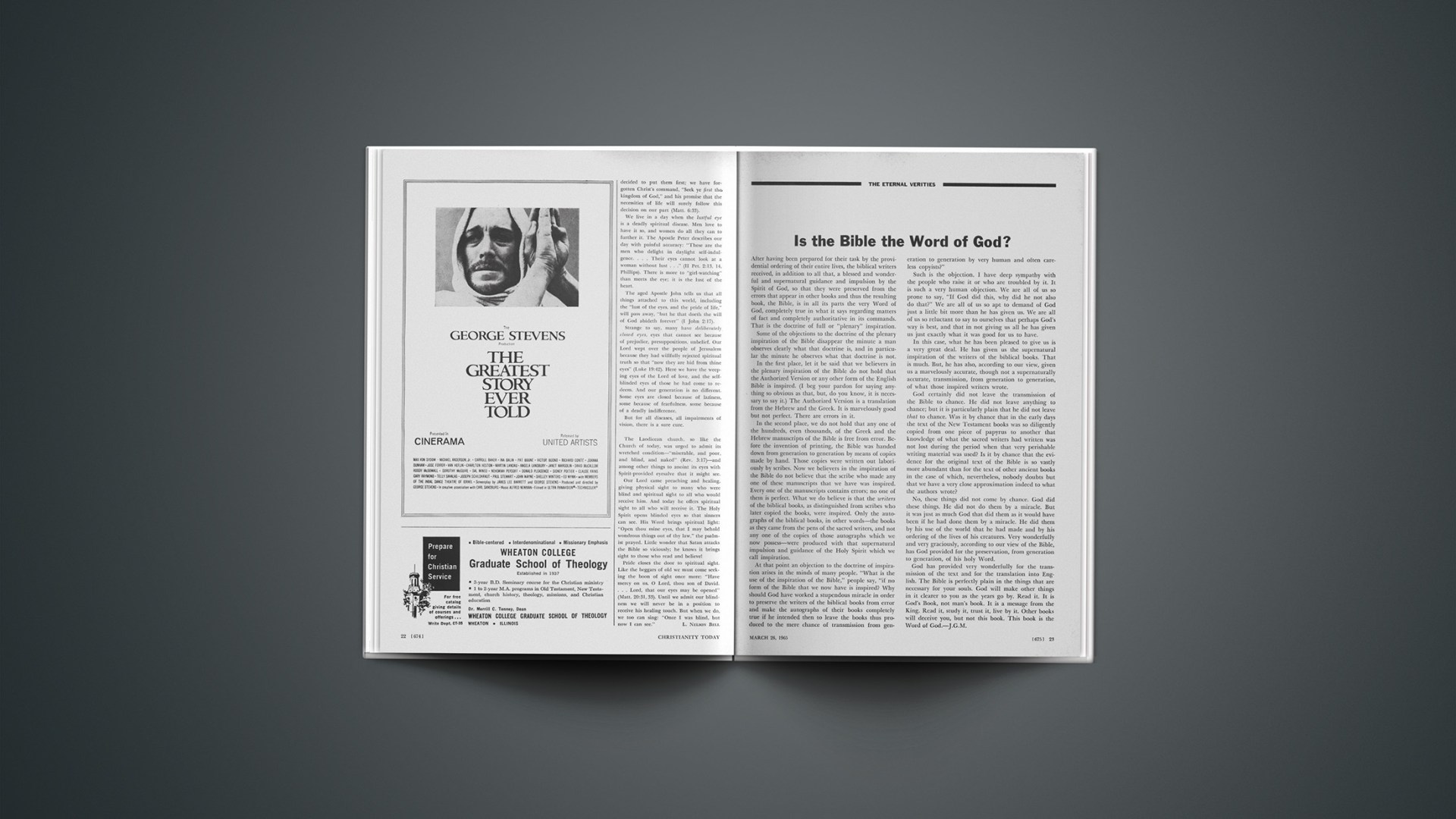After having been prepared for their task by the providential ordering of their entire lives, the biblical writers received, in addition to all that, a blessed and wonderful and supernatural guidance and impulsion by the Spirit of God, so that they were preserved from the errors that appear in other books and thus the resulting book, the Bible, is in all its parts the very Word of God, completely true in what it says regarding matters of fact and completely authoritative in its commands. That is the doctrine of full or “plenary” inspiration.
Some of the objections to the doctrine of the plenary inspiration of the Bible disappear the minute a man observes clearly what that doctrine is, and in particular the minute he observes what that doctrine is not.
In the first place, let it be said that we believers in the plenary inspiration of the Bible do not hold that the Authorized Version or any other form of the English Bible is inspired. (I beg your pardon for saying anything so obvious as that, but, do you know, it is necessary to say it.) The Authorized Version is a translation from the Hebrew and the Greek. It is marvelously good but not perfect. There are errors in it.
In the second place, we do not hold that any one of the hundreds, even thousands, of the Greek and the Hebrew manuscripts of the Bible is free from error. Before the invention of printing, the Bible was handed down from generation to generation by means of copies made by hand. Those copies were written out laboriously by scribes. Now we believers in the inspiration of the Bible do not believe that the scribe who made any one of these manuscripts that we have was inspired. Every one of the manuscripts contains errors; no one of them is perfect. What we do believe is that the writers of the biblical books, as distinguished from scribes who later copied the books, were inspired. Only the autographs of the biblical books, in other words—the books as they came from the pens of the sacred writers, and not any one of the copies of those autographs which we now possess—were produced with that supernatural impulsion and guidance of the Holy Spirit which we call inspiration.
At that point an objection to the doctrine of inspiration arises in the minds of many people. “What is the use of the inspiration of the Bible,” people say, “if no form of the Bible that we now have is inspired? Why should God have worked a stupendous miracle in order to preserve the writers of the biblical books from error and make the autographs of their books completely true if he intended then to leave the books thus produced to the mere chance of transmission from generation to generation by very human and often careless copyists?”
Such is the objection. I have deep sympathy with the people who raise it or who are troubled by it. It is such a very human objection. We are all of us so prone to say, “If God did this, why did he not also do that?” We are all of us so apt to demand of God just a little bit more than he has given us. We are all of us so reluctant to say to ourselves that perhaps God’s way is best, and that in not giving us all he has given us just exactly what it was good for us to have.
In this case, what he has been pleased to give us is a very great deal. He has given us the supernatural inspiration of the writers of the biblical books. That is much. But, he has also, according to our view, given us a marvelously accurate, though not a supernaturally accurate, transmission, from generation to generation, of what those inspired writers wrote.
God certainly did not leave the transmission of the Bible to chance. He did not leave anything to chance; but it is particularly plain that he did not leave that to chance. Was it by chance that in the early days the text of the New Testament books was so diligently copied from one piece of papyrus to another that knowledge of what the sacred writers had written was not lost during the period when that very perishable writing material was used? Is it by chance that the evidence for the original text of the Bible is so vastly more abundant than for the text of other ancient books in the case of which, nevertheless, nobody doubts but that we have a very close approximation indeed to what the authors wrote?
No, these things did not come by chance. God did these things. He did not do them by a miracle. But it was just as much God that did them as it would have been if he had done them by a miracle. He did them by his use of the world that he had made and by his ordering of the lives of his creatures. Very wonderfully and very graciously, according to our view of the Bible, has God provided for the preservation, from generation to generation, of his holy Word.
God has provided very wonderfully for the transmission of the text and for the translation into English. The Bible is perfectly plain in the things that are necessary for your souls. God will make other things in it clearer to you as the years go by. Read it. It is God’s Book, not man’s book. It is a message from the King. Read it, study it, trust it, live by it. Other books will deceive you, but not this book. This book is the Word of God.—J.G.M.










